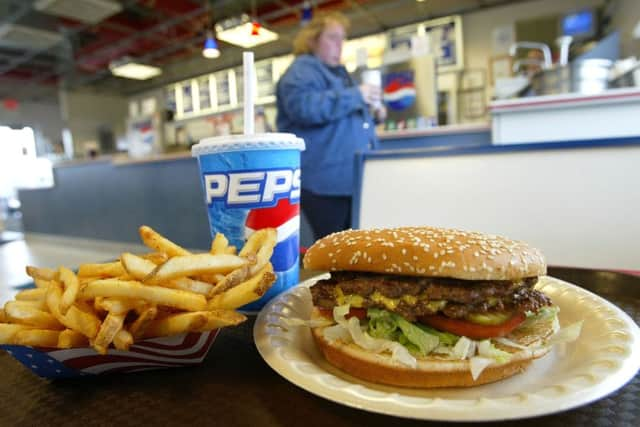Lori Anderson: ‘Fat tax’ argument carries weight


Fat used to be a feminist issue but now we’re all bursting out of our seams like jewel-smuggling teddy bears. Some of us are chaffing our way through summer, drowning in adiposal misery. While our daily repasts were once consumed at set times with nothing passing our lips in between, now many of us endlessly graze ourselves into a junk-food-induced torpor. But lo, the Lone Ranger could soon be riding in to save the day and he may have exchanged the stetson for the bowler hat and briefcase of the taxman.
The weighty issue of Britain’s obesity crisis slumped and oozed across the news pages last week when in England a BMA conference on public health debated the issue of whether or not there should be an introduction of a new tax on saturated fats and a pre-watershed ban on TV advertising for processed foods while in Scotland the Royal College of Physicians of Edinburgh held a conference entitled: Obesity: a 21st century epidemic?
Advertisement
Hide AdAdvertisement
Hide AdIn England Dr Martin Breach, a GP argued in favour of Her Majesty’s Revenue and Customs taking on the role of national weight watcher by raising the price of those junk foods with high fat and calorie counts.


In Scotland, Professor Simon Capewell, chair of clinical epidemiology at Liverpool University, told the Edinburgh audience that the Scottish Government had an excellent track record in leading the way in public health issues and could champion the fight against obesity and introduce a tax on soft drinks.
There is now a growing belief that sugar and fat should be regulated and exorbitantly taxed in the same way as alcohol and tobacco. The problem is that while the latter products are easily categorised, the former are much more difficult to legislate against. After all, earlier this year there was compelling research that claimed saturated fat was not quite the heart-attack-inducing bogeyman it has long been claimed. We are aware of the problems caused by alcoholic excess and smoking but they are both likely to be dwarfed in forthcoming decades by the issue of obesity. Britain is the fat man of Europe and the Scots are the fat men of Britain with 26 per cent of the male population classed as obese, 23 per cent of the female population and more than one in four children, 28 per cent, in danger of becoming overweight or obese dangerously. We are seeing type 2 diabetes in children, a medical condition usually found only among the hefty middle aged.
Obesity is a modern condition with rates having risen by a staggering 400 per cent in the past 25 years and much of the problem can be laid at the door of the junk food, soft drinks and confectionary industry for introducing into our diets massive amounts of fat and sugar, which light up the pleasure sensors in our brains like a well-played pinball machine. Yet together they have always argued that the problem is not too much of the wrong food but too little physical exercise. This is a clever move by these big corporations as it says that the issue “isn’t with us, it’s with you.” The gun lobby in America has adopted a similar approach, after every school shooting they will point to Hollywood and ring their hands and berate film-makers for the rise in screen violence.
Cadbury even had a programme where schools were rewarded with gym equipment if their pupils bought and collected enough chocolate bar wrappers. Think about it – after we’ve helped put the weight on we’ll help get it off. Except they can’t. The big con is that aerobic exercise will help you lose weight. It will, but in the same way that a teaspoon will help you to empty a bath. If eating fatty chocolates and junk food puts on weight by the bucket load why concentrate on a method that takes it off by the teaspoon? Focus on the bucket.
I’m cautiously in favour of a junk food tax and sugar tax as I think the issue of obesity is of mounting concern and the public require some degree of protection against a food industry whose primary concern is profits. The question is will it work? When the Danish government introduced a tax on saturated fats their target was crisps and hotdogs but they also hit the purveyors of quality cheese and the nation’s famous bacon. The result was that the public voted with their feet and began shopping in Sweden and Germany, thus profiting their neighbours by an extra £1.3 billion. In the face of public complaints the government backed down and scrapped the tax after only a year to the anger of the nation’s doctors who pointed out that a survey by Copenhagen University showed that sales of butter, margarine and cooking oil was down by 10-20 per cent.
It will be of little surprise that the British Soft Drinks Association is against any punitive health levy on its products and insists that a 20 per cent rise will lead to a reduction of only four calories per day (personally I’m sceptical about their stats) and that, either way, consumption of soft drinks has dropped by 9 per cent in the past decade while obesity has risen by 15 per cent.
The argument that the people who will be hardest hit will be the poorest who currently spend the most on “unhealthy foods” is valid but doesn’t mean that it isn’t necessary as they will have the most to gain in terms of health, fitness and a longer life if their dietary habits can be turned in a more positive direction. The Scottish Government hasn’t yet decided whether to bow to Professor Capewell’s flattery with a spokesman stating that they will consider the evidence of the effect of food taxes in “helping to improve dietary choices”.
The maxim “moderation in all things” is one to live by, and sometimes we need the helping hand of government to put the sticky bun down.